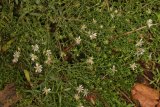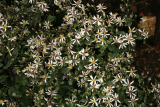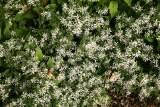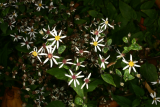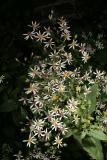Additional notes (click to expand)
Medicinal
The following notes refer to the related species E. macrophyllus' (formerly Aster macrophyllus) use in the traditional medicine of the North American indigenous people.
The roots have been used as a blood medicine. An infusion of the root has been used to bathe the head to treat headaches. A compound decoction of the roots has been used as a laxative in the treatment of venereal disease[Moerman. D. Native American Ethnobotany Timber Press. Oregon. 1998].
https://pfaf.org https://pfaf.org/user/Plant.aspx?LatinName=Aster+macrophyllus
Nomenclature
Formerly known as Aster divaricatus.
Other use
The young leaves of the plant can be cooked and eaten.
http://www.pfaf.org,
Geographical distribution
- Northern America, Eastern Canada, Ontario
- Northern America, Northeastern U.S.A., Maine
- Northern America, Northeastern U.S.A., Masachusettes
- Northern America, Northeastern U.S.A., New Hampshire
- Northern America, Northeastern U.S.A., New York
- Northern America, Northeastern U.S.A., Ohio
- Northern America, Northeastern U.S.A., Pennsylvania
- Northern America, Northeastern U.S.A., Rhode I.
- Northern America, Northeastern U.S.A., Vermont
- Northern America, Northeastern U.S.A., West Virginia
- Northern America, Northwestern U.S.A., Colorado
- Northern America, Southeastern U.S.A., Alabama
- Northern America, Southeastern U.S.A., Delaware
- Northern America, Southeastern U.S.A., District of Columbia
- Northern America, Southeastern U.S.A., Georgia
- Northern America, Southeastern U.S.A., Kentucky
- Northern America, Southeastern U.S.A., Maryland
- Northern America, Southeastern U.S.A., North Carolina
- Northern America, Southeastern U.S.A., South Carolina
- Northern America, Southeastern U.S.A., Tennessee
- Northern America, Southeastern U.S.A., Virginia
Eurybia divaricata (L.) G. L. Nesom
Family: ASTERACEAEGenus: Eurybia
Species: divaricata (L.) G. L. Nesom
Common names: White Wood Aster
Distribution summary: E. North America
Habit: Perennial
Hardiness: H7 - Very hardy
Habitat: Woodlands
Garden status: Currently grown
Garden location: North America (A)
Flowering months: August, September
Reason for growing: Other use
